Options
Sample measurement options
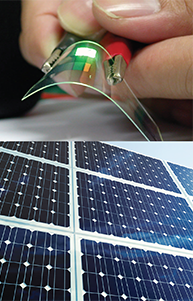 84030 AC measurementThe AC field measurement option breaks through the barriers of traditional DC field Hall measurements, extending your Hall mobility measurement capabilities down to 0.001 cm2/V s, allowing you to measure low mobility materials with far greater resolution. |
84006 room temperature optical access body with top side optical access
Optical access allows you to expose samples to different wavelengths of light via a laser or fiber optic. The 84006 option is a room temperature body that adds top side optical access capability to the standard HMS sample insert.
The 84060 sample top side optical access kit is required for operation and must be ordered separately.
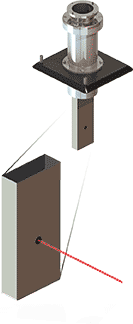
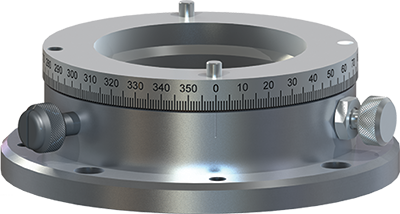
The sample rotation option adds 0° to 360° manual sample rotation to your HMS. It is available as an option with either the standard light tight body or the 84015 single point LN2 body. (It comes standard with the 84016 CCR and the 84017 oven.) Sample rotation is usable with the 10 mm sized sample cards. It is not compatible with 50 mm cards.
84031 high resistance
Materials such as semi-insulating GaAs, photo-detectors and solid state x-ray detectors are characterized by very high resistances and can be difficult to measure in a traditional Hall effect measurement system. The high resistance option extends the resistance measurement capabilities of your HMS up to 200 GΩ for DC measurements and 8 GΩ for AC measurements. When this option is added to your system, electrometer grade buffers are used to minimize loading, and the guard in the signal leads minimizes the effect of current leakage. The challenges in measuring high resistance samples in a Hall effect measurement system are no match when you add the high resistance measurement option to your configuration.
84032 gate bias
Adding a gate terminal to materials increases the flexibility of the Hall measurement. For instance, a gate voltage can be used to control the carrier density of a material. With this option, the gate bias voltage can be set to the user-determined value. The standard AC or DC Hall measurement and resistivity measurement are then available.
84033 low resistance
Metals, superconductors, and certain other materials are characterized by low resistances and can sometimes be difficult to measure in a Hall measurement system. This is because below about 1 Ω, the voltage across the sample becomes too small to measure reliably. In theory, it may seem practical to simply increase the current in an attempt to increase the sample voltage, but this is rarely a viable option. Doing so may cause self-heating and could damage your sample. While current reversal and measurement averaging can combat these effects, it can take a very long time to achieve the desired resolution. So this method can be both inefficient and unreliable.
The best solution is the 84033 low resistance measurement option. It extends the low resistance measurement capabilities of DC field Hall measurements, allowing you to measure low resistance samples or thermoelectric materials in your HMS with confidence. When measuring certain metals, for example, it reduces the resistance noise floor of DC measurements from 100 nV to 3 nV (from 1 µΩ to 0.03 µΩ at 100 mA). This option can be added to the system in the field at any time (but it is not usable at the same time as the 84030 AC field measurement option).
Magnet field options
84060 sample top side optical access kit
Used in combination with the 84006 room temperature optical access body or 84016-O CCR with optical access, this option includes core pole cap modifications for 6.35 mm (0.25 in) optical access to the top side of the sample (in the magnetic field direction).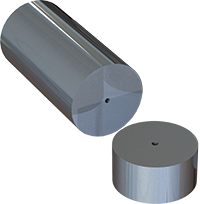
Modified magnet pole caps
and cores for optical access (if ordered with the system, these will already be installed)
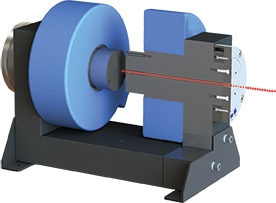
Showing the path of the light source to the sample
Pole cap choices for higher uniformity or higher field density
With the Model 8404 system, you receive 51 mm (2 in) face diameter pole caps for the system’s 4 in electromagnet. These tapered caps yield higher fields but lower field uniformity. However, as an option, you can order cylindrical 102 mm (4 in) face diameter pole caps for the Model 8404 by specifying the EM4-4PB field option. Because they feature a larger pole cap face diameter, these caps ensure higher uniformity over the full surface of your sample (while sacrificing a small amount of magnetic field density).

The 51 mm (2 in) EM7-2P pole cap

The 104 mm (4 in) EM4-4PB pole cap
The Model 8407 system includes cylindrical 102 mm (4 in) face diameter pole caps as standard for higher field uniformity over the full surface. Higher uniformity is required when using the closed loop field control capability that is standard in the Model 8407 (optional in the Model 8404) and also provides better measurement results when using any temperature options. If you value magnet strength over uniformity and want to maximize the larger field of the 7 in electromagnet, you can optionally order 51 mm (2 in) face diameter pole caps (EM7-2P). These focus the magnetic flux from the pole core to the face.
Because the pole caps are bolted on, they can easily be exchanged for different pole face diameters at any time.
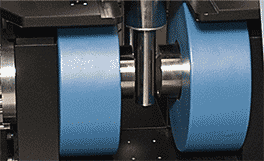
Model 8404 system shown with the optional 104 mm (4 in) EM4-4PB pole caps installed
Temperature options
84015 single point LN2 body
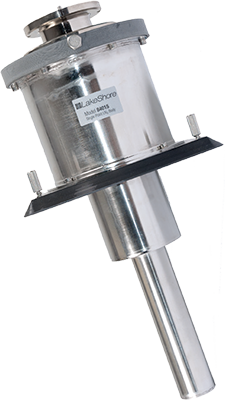
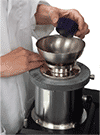
Comes with custom funnel and plug
The single point LN2 body combined with the standard insert allows you to take a measurement at a fixed temperature of 77 K in addition to room temperature. You can then determine if the temperature behavior of the resistivity and Hall coefficient of your samples is as expected without having to add a full variable temperature assembly. Simply fill the sample environment with liquid nitrogen, and proceed with your measurements. Operation is both easy and efficient. The 84010 sample rotation option is available for applications requiring sample rotation.
While not required, if you would like to monitor the temperature of your samples, you may choose to purchase one of our sample temperature monitoring or variable temperature control options separately. The optional Lake Shore sample cards with an integrated platinum RTD are required to monitor temperature.
84016 closed cycle refrigerator (CCR)
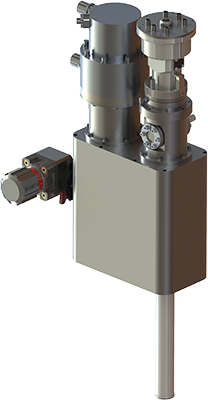
CCRs provide a variable temperature cryogenic environment by cooling helium exchange gas. No liquid cryogens are required so ongoing operating costs are minimal. In order to optimize efficiency and throughput, your sample is surrounded by helium gas at a pressure slightly above atmosphere, allowing samples to be exchanged without breaking vacuum or warming the CCR. Pump out of the vacuum jacket to 100 Pa (0.1 Torr) is required prior to cool down.

The CCR single sample insert has a sapphire pad and solder posts
84016-O optical access CCR
The CCR will also be available in a sample top side optical access version: 84016-O. When combined with the 84060 sample top side optical access kit, the optical access CCR will allow you to study the effects that various wavelengths of light may have on your material samples at cryogenic temperatures.
84017 oven
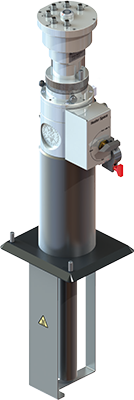
The Hall system oven allows you to study the effects on your material as you heat your sample to as hot as 1,273 K*. It is rigidly mounted to the electromagnet frame and positioned between the electromagnet pole faces. The oven insert is placed into the top of the oven body and attaches via captive thumb screws. Because the oven body and oven insert form a vacuum-tight enclosure, sample heating can be done under an inert gas atmosphere—argon is recommended. The oven insert has a temperature sensor mounted near the sample location to ensure a reliable temperature measurement feedback loop.
*At 773 K and ±1% rdg: maximum = 1 MΩ; at 1,273 K and ±1% rdg: maximum = 1 kΩ

The oven single sample insert has 4 prober pins

Gas handler

Model 336 temperature controller
841-STM sample temperature monitoring
Conveniently monitor the temperature of your samples through the standard insert with a Lake Shore Model 336 temperature controller. The 841-STM can be upgraded to the 840-VTA at any time, so if you feel you may at some point add variable temperature capability to your HMS, this option should be chosen over the 842-STM. The 841-STM requires a sample card with integrated platinum RTD if monitoring temperatures in the 84015 or at RT.
TPS-FRG compact turbo pumping system with gauge
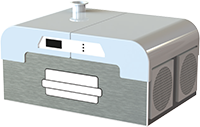 The pumping system is used to pump out the vacuum jacket and transfer line spaces. It can also be used in place of a mechanical fore vacuum pump with the 84017 oven.
The pumping system is used to pump out the vacuum jacket and transfer line spaces. It can also be used in place of a mechanical fore vacuum pump with the 84017 oven.

